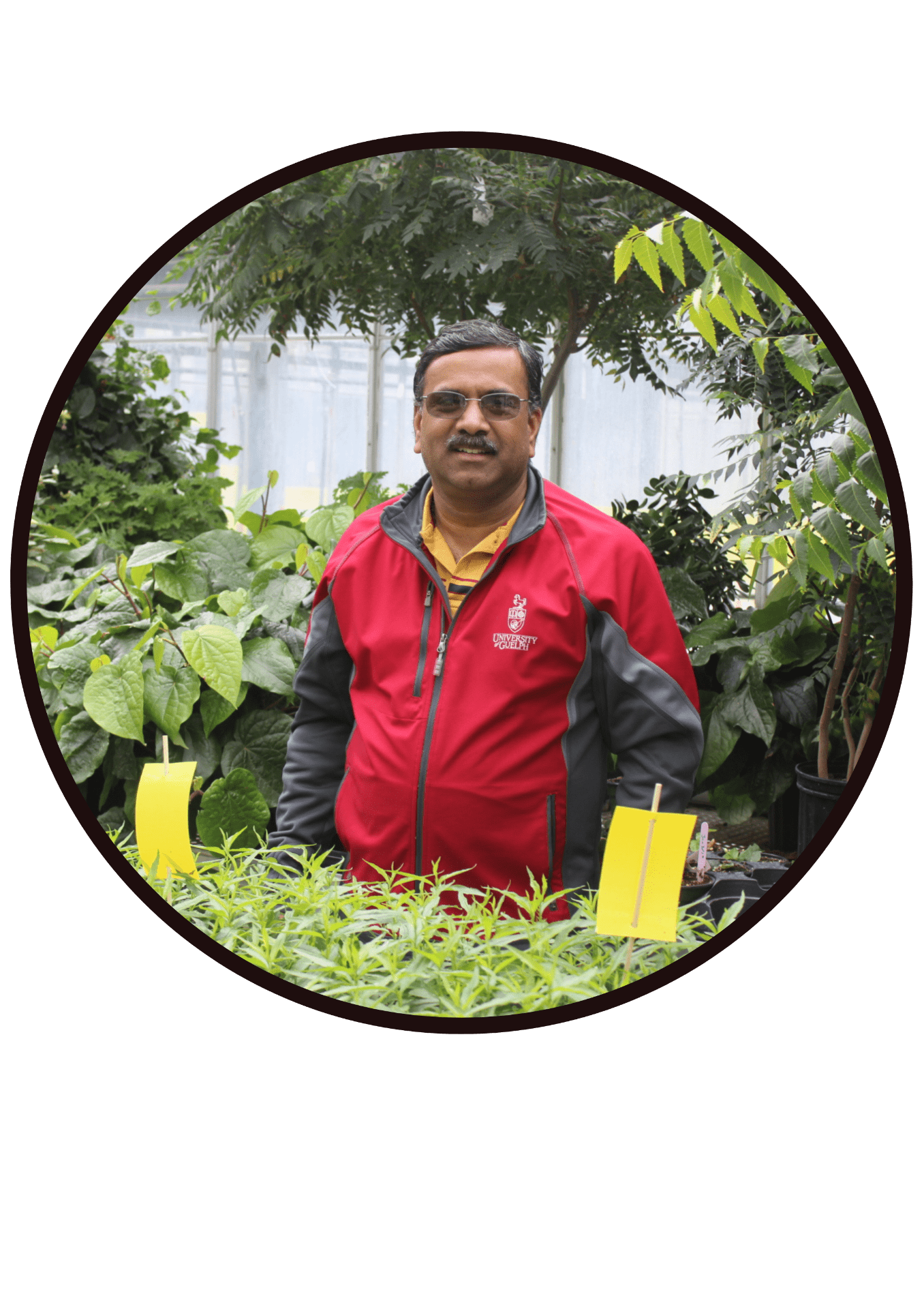This list provides a partial representation of faculty members involved in rural research and is continuously expanding with new additions each day.
To search names and keywords, you can use ‘Command/Control + F’

Alejandro Marangoni
College: Ontario Agricultural College
Department: Department of Food Science
Position: Professor
Bio: Dr. Alejandro G. Marangoni is a Professor and Tier I Canada Research Chair in Food, Health and Aging at the University of Guelph, Canada. His work concentrates on the physical properties of food materials in foods, cosmetics and biolubricants, with particular emphasis on sustainability, preservation of biodiversity and health. With an H-index of 90, i-index of 419 and over 28,000 citations of his work, he has published over 500 refereed research articles, 90 book chapters, 18 books, and over 40 patents. He is the recipient of the 2013 AOCS Stephen Chang award, the 2014 IFT Chang Award in Lipid Science, the 2014 AOCS Supelco/Nicholas Pelick Award, the 2015 ISF Kaufmann Medal, the 2017 AOCS Alton E. Bailey Medal, and the 2019 European Lipid Technology Award from EuroFed Lipids. Marangoni is a fellow of the American Oil Chemists’ Society, the Institute of Food Technologists and the Royal Society of Chemistry (U.K.). He is the Editor in Chief of both Current Opinion and Current Research in Food Science. Dr. Marangoni has also founded and commercialized 3 major technology platforms with global reach. Dr. Marangoni was honored as one of the 10 most influential Hispanic Canadians in 2012, a Fellow of the Royal Society of Canada in 2018, and an Officer of the Order of Canada in 2021.
Research Projects: Enzymatic glycerolysis converts vegetable oils into structural fats with the potential to replace palm oil in food products, Tempering of cocoa butter and chocolate using minor lipidic components, Higher palmitic acid and dipalmitoyloleate levels are correlated to increased firmness in commercial butter, Data deficits and transparency: What led to Canada’s ‘ButterGate’, Particle filled protein-starch composites for plant-based meat analogues, A facile strategy for plant protein fiber formation in meat analogues without extrusion or shear processing, Synergistic interactions between dilute suspensions of pea protein isolate and rapid swelling starch, Methodology and development of high protein plant-based cheese, Optimization and scale up of enzymatic glycerolysis for the conversion of plant oils into animal fat mimetics
Email: amarango@uoguelph.ca
Website: CRC Food and Health
College: Ontario Agricultural College
Department: Department of Food Science
Position: Professor
Bio: Dr. Alejandro G. Marangoni is a Professor and Tier I Canada Research Chair in Food, Health and Aging at the University of Guelph, Canada. His work concentrates on the physical properties of food materials in foods, cosmetics and biolubricants, with particular emphasis on sustainability, preservation of biodiversity and health. With an H-index of 90, i-index of 419 and over 28,000 citations of his work, he has published over 500 refereed research articles, 90 book chapters, 18 books, and over 40 patents. He is the recipient of the 2013 AOCS Stephen Chang award, the 2014 IFT Chang Award in Lipid Science, the 2014 AOCS Supelco/Nicholas Pelick Award, the 2015 ISF Kaufmann Medal, the 2017 AOCS Alton E. Bailey Medal, and the 2019 European Lipid Technology Award from EuroFed Lipids. Marangoni is a fellow of the American Oil Chemists’ Society, the Institute of Food Technologists and the Royal Society of Chemistry (U.K.). He is the Editor in Chief of both Current Opinion and Current Research in Food Science. Dr. Marangoni has also founded and commercialized 3 major technology platforms with global reach. Dr. Marangoni was honored as one of the 10 most influential Hispanic Canadians in 2012, a Fellow of the Royal Society of Canada in 2018, and an Officer of the Order of Canada in 2021.
Research Projects: Enzymatic glycerolysis converts vegetable oils into structural fats with the potential to replace palm oil in food products, Tempering of cocoa butter and chocolate using minor lipidic components, Higher palmitic acid and dipalmitoyloleate levels are correlated to increased firmness in commercial butter, Data deficits and transparency: What led to Canada’s ‘ButterGate’, Particle filled protein-starch composites for plant-based meat analogues, A facile strategy for plant protein fiber formation in meat analogues without extrusion or shear processing, Synergistic interactions between dilute suspensions of pea protein isolate and rapid swelling starch, Methodology and development of high protein plant-based cheese, Optimization and scale up of enzymatic glycerolysis for the conversion of plant oils into animal fat mimetics
Email: amarango@uoguelph.ca
Website: CRC Food and Health

Belinda Leach
College: College of Social & Applied Human Sciences
Department: Department of Sociology and Anthropology
Position: Professor Emeritus
Bio: Prof. Belinda Leach’s research interests include anthropology and history, culture and class, economic restructuring, migration, gender, paid and unpaid work, women’s and feminist organizations, development, industrial homework, feminist memorializing, violence against women, rural communities, and Canada and the Caribbean.
UoG Expert Profile: Belinda Leach’s UoGuelph Expert Profile
Publications:
LinkedIn: Belinda Leach’s LinkedIn Profile
College: College of Social & Applied Human Sciences
Department: Department of Sociology and Anthropology
Position: Professor Emeritus
Bio: Prof. Belinda Leach’s research interests include anthropology and history, culture and class, economic restructuring, migration, gender, paid and unpaid work, women’s and feminist organizations, development, industrial homework, feminist memorializing, violence against women, rural communities, and Canada and the Caribbean.
UoG Expert Profile: Belinda Leach’s UoGuelph Expert Profile
Publications:
-
Books:
- 2012. Beverly Leipert, Belinda Leach and Wilfreda Thurston (Eds). Rural Women’s Health in Canada. Toronto: University of Toronto Press. Link
- 2011. Barbara Pini and Belinda Leach (eds). Reshaping Class and Gender in Rural Spaces. London: Ashgate. Link
- 2002. Anthony Winson and Belinda Leach. Contingent Work, Disrupted Lives: Labour and Community in the New Rural Economy. Toronto: University of Toronto Press.
-
Peer-Reviewed Journal publications:
- 2023. Alexandra Siberry, Tracey L. Adams and Belinda Leach. “Place matters”: Midwives’ interprofessional relations in rural and urban institutional contexts. SSM – Qualitative Research in Health. 2023 (4). Link
- 2022. Philomena De Lima, Belinda Leach, David Radford and Seema Arora-Jonsson (eds). Editorial: The Well-being of International Migrants in Rural Areas: Bridging the Migration-Development Nexus. Special issue on The Well-being of International Migrants in Rural Areas: Bridging the Migration-Development Nexus. Frontiers in Sociology: Migration and Society. Link
- 2021. Philomena De Lima, Belinda Leach, David Radford and Seema Arora-Jonsson (eds). Special issue on The Well-being of International Migrants in Rural Areas: Bridging the Migration-Development Nexus. Frontiers in Sociology: Migration and Society.
- 2011. Belinda Leach and Gillian Joseph. Long Term Care Work in Rural Communities: Health Care Restructuring at the Intersection of Rurality, Gender, and Class. Canadian Journal on Aging. Link
- 2007. Belinda Leach, A. Leadbetter, K. Preibisch, J.P. Sousa and C. Yates. Diverse workplaces, homogenous towns: Some preliminary findings from Rural Southern Ontario”. Our Diverse Cities. Summer.
- 1995. Belinda Leach and Anthony Winson. Bringing ‘globalisation’ down to earth: Restructuring and labour in rural communities. Canadian Review of Sociology and Anthropology 32(3). Link
-
Chapters in Books:
- 2016. G. Joseph and Belinda Leach. Neoliberalism, temporary foreign workers, and precarious elder care/elder care work. In: Diverse Perspectives on Aging in a Changing World. G. Joseph (ed). New York: Routledge.
- 2014. Belinda Leach. Feminist connections in and beyond the rural. In: Barbara Pini, Berit Branth and Jo Little (eds). Feminisms and Ruralities. Lexington Books. Link
LinkedIn: Belinda Leach’s LinkedIn Profile

Bonnie Mallard
College: OVC – Ontario Veterinary College
Position: Professor of Immunology and Immunogenetics
Areas of expertise: With a BSc (Agriculture), MSc (Quantitative Genetics & Animal Breeding) and PhD (Immunology & Immunogenetics), Professor Mallard is well positioned to discuss the impact of genetic and genomic regulation of the immune system on resistance to infectious disease. Her research focuses mainly on preventative approaches to improve health that are sustainable for the environment, and that enhance both human and animal well-being. She has worked with numerous species over three decades (cattle, swine, poultry, horses, other), and is well positioned to speak about infectious diseases, including zoonotic diseases passed between animals and humans that are responsible for the majority of epidemics and pandemics. Dr. Mallard also has an interest in immunoceuticals which help naturally boost immunity. She has taught immunology for 30 years at the undergraduate and most advanced graduate levels. Dr. Mallard’s faculty awards include: Pzifer Award for Research Excellence, the World Dairy Expo Innovation Award for Immunity+/High Immune Response (HIR™) Technology, the Zoetis Research Award for work in immunogenetics and the University of Guelph 30 Years of Service recognition. In 2017, Professor Mallard won the prestigious Canada’s Governor General’s Award for Innovation in recognition of the High Immune Response technology. In 2018, she received the University of Guelph Innovation of the Year Award, the YMCA Women of Distinction Award and the Lifetime Achievement Award. In 2018, along with the Semex Alliance they won the best new product award for the genomics test for HIR, called Immunity female in the Elevate platform, as well as the Summit Award in 2019 for the Crushing Disease campaign with Immunity+. Dr. Mallard was the 2020-21 winner of the prestigious NSERC Synergy Prize making her the first Canadian to have won both the Governor General’s Award and the NSERC Synergy Prize for innovations in the area of immunogenetics.
Website(s): U of Guelph News – HIR Technology
Email: bmallard@uoguelph.ca
Phone number: 519-824-4120 ext. 54736
College: OVC – Ontario Veterinary College
Position: Professor of Immunology and Immunogenetics
Areas of expertise: With a BSc (Agriculture), MSc (Quantitative Genetics & Animal Breeding) and PhD (Immunology & Immunogenetics), Professor Mallard is well positioned to discuss the impact of genetic and genomic regulation of the immune system on resistance to infectious disease. Her research focuses mainly on preventative approaches to improve health that are sustainable for the environment, and that enhance both human and animal well-being. She has worked with numerous species over three decades (cattle, swine, poultry, horses, other), and is well positioned to speak about infectious diseases, including zoonotic diseases passed between animals and humans that are responsible for the majority of epidemics and pandemics. Dr. Mallard also has an interest in immunoceuticals which help naturally boost immunity. She has taught immunology for 30 years at the undergraduate and most advanced graduate levels. Dr. Mallard’s faculty awards include: Pzifer Award for Research Excellence, the World Dairy Expo Innovation Award for Immunity+/High Immune Response (HIR™) Technology, the Zoetis Research Award for work in immunogenetics and the University of Guelph 30 Years of Service recognition. In 2017, Professor Mallard won the prestigious Canada’s Governor General’s Award for Innovation in recognition of the High Immune Response technology. In 2018, she received the University of Guelph Innovation of the Year Award, the YMCA Women of Distinction Award and the Lifetime Achievement Award. In 2018, along with the Semex Alliance they won the best new product award for the genomics test for HIR, called Immunity female in the Elevate platform, as well as the Summit Award in 2019 for the Crushing Disease campaign with Immunity+. Dr. Mallard was the 2020-21 winner of the prestigious NSERC Synergy Prize making her the first Canadian to have won both the Governor General’s Award and the NSERC Synergy Prize for innovations in the area of immunogenetics.
Website(s): U of Guelph News – HIR Technology
Email: bmallard@uoguelph.ca
Phone number: 519-824-4120 ext. 54736

Christine Baes
College: Ontario Agricultural College
Department: Department of Animal Biosciences
Position: Professor and Department Chair; Canada Research Chair in Livestock Genomics
Bio: Dr. Christine Baes is a geneticist with extensive expertise in quantitative genetics and statistical genomics applied to livestock breeding improvement. Raised on a dairy farm, she holds advanced degrees from Guelph, Germany, and Switzerland. Dr. Baes has worked on international livestock projects and teaches genetics courses. Her research focus includes developing new selection methods and models to enhance animal health, welfare, and productivity through genetics. Using large genomic datasets, Dr. Baes and her team aim to uncover genotype-phenotype relationships and design sustainable breeding strategies. She manages a small farm outside of Maryhill in her spare time.
Websites & Projects: The Resilient Dairy Genome Project, LinkedIn, ResearchGate
Twitter: @BaesC1
Email: cbaes@uoguelph.ca
Phone: (519) 824-4120 ext. 53363
College: Ontario Agricultural College
Department: Department of Animal Biosciences
Position: Professor and Department Chair; Canada Research Chair in Livestock Genomics
Bio: Dr. Christine Baes is a geneticist with extensive expertise in quantitative genetics and statistical genomics applied to livestock breeding improvement. Raised on a dairy farm, she holds advanced degrees from Guelph, Germany, and Switzerland. Dr. Baes has worked on international livestock projects and teaches genetics courses. Her research focus includes developing new selection methods and models to enhance animal health, welfare, and productivity through genetics. Using large genomic datasets, Dr. Baes and her team aim to uncover genotype-phenotype relationships and design sustainable breeding strategies. She manages a small farm outside of Maryhill in her spare time.
Websites & Projects: The Resilient Dairy Genome Project, LinkedIn, ResearchGate
Twitter: @BaesC1
Email: cbaes@uoguelph.ca
Phone: (519) 824-4120 ext. 53363

Brandon Gilroyed
College: Ontario Agricultural College
Department: School of Environmental Sciences
Position: Associate Professor
Bio: Dr. Brandon Gilroyed is an Associate Professor from the School of Environmental Sciences and serves as the Director for the Centre for Agricultural Renewable Energy and Sustainability (CARES) at the University of Guelph Ridgetown Campus. Having received a BSc in Molecular Genetics and a BSc in Plant Biology from the University of Alberta, Dr. Gilroyed went on to complete a PhD in Civil Engineering from the University of Calgary, and a Postdoc with Agriculture and Agri-Food Canada. Dr. Gilroyed’s interdisciplinary research focuses on the connections between renewable energy production, agricultural byproducts and wastes, and the environment in the context of rural Ontario.
Website(s): U of Guelph – Brandon Gilroyed, LinkedIn
Email: bgilroye@uoguelph.ca
Twitter: @BGilroyed
College: Ontario Agricultural College
Department: School of Environmental Sciences
Position: Associate Professor
Bio: Dr. Brandon Gilroyed is an Associate Professor from the School of Environmental Sciences and serves as the Director for the Centre for Agricultural Renewable Energy and Sustainability (CARES) at the University of Guelph Ridgetown Campus. Having received a BSc in Molecular Genetics and a BSc in Plant Biology from the University of Alberta, Dr. Gilroyed went on to complete a PhD in Civil Engineering from the University of Calgary, and a Postdoc with Agriculture and Agri-Food Canada. Dr. Gilroyed’s interdisciplinary research focuses on the connections between renewable energy production, agricultural byproducts and wastes, and the environment in the context of rural Ontario.
Website(s): U of Guelph – Brandon Gilroyed, LinkedIn
Email: bgilroye@uoguelph.ca
Twitter: @BGilroyed

David Kelton
College: Ontario Veterinary College
Department: Population Medicine
Position: Professor Emeritus
Bio: David Kelton holds the DVM, MSc and PhD degrees, all from the University of Guelph. He is a Fellow of the Canadian Academy of Health Sciences, a national body that advises the government of Canada on health policy through a One Health lens. He is recently retired professor of veterinary epidemiology and held the Dairy Farmers of Ontario (DFO) Dairy Cattle Health Research Chair in the Department of Population Medicine for 10 years. He is a founding member of Canadian Bovine Mastitis Network and Dairy at Guelph, a past-president of the National Mastitis Council, and the Chair of the International Dairy Federation Standing Committee on Animal Health and Welfare, where he also chairs the IDF Working Group on Paratuberculosis. For the last 30 years he has taught dairy cattle health and management in the undergraduate, graduate and professional curriculum and is a member of several local, provincial and national working groups dealing with dairy cattle health, welfare and milk quality. He is a past member of the DFO Research Committee and has advised the provincial producer organization on issues related to animal health and welfare, and milk safety and quality, and has recently been appointed to the Dairy Farmers of Canada Expert Research Committee. He has co-authored more than 300 manuscripts in refereed journals. His research interests include paratuberculosis (Johne’s Disease), mastitis and lameness, with a focus on their detection and control in dairy herds and their impacts on health, productivity and welfare. His recent work has focused on antimicrobial use and the development of antimicrobial resistance, using a One Health approach that embraces transdisciplinary collaboration. Beyond his work for the IDF, Dr. Kelton has consulted on many international projects focusing on animal health, food safety and control of zoonotic diseases across North America, Europe, North Africa and Asia.
Website(s): OVC – David Kelton
Email: dkelton@ovc.uoguelph.ca
Twitter: @DrDFK
College: Ontario Veterinary College
Department: Population Medicine
Position: Professor Emeritus
Bio: David Kelton holds the DVM, MSc and PhD degrees, all from the University of Guelph. He is a Fellow of the Canadian Academy of Health Sciences, a national body that advises the government of Canada on health policy through a One Health lens. He is recently retired professor of veterinary epidemiology and held the Dairy Farmers of Ontario (DFO) Dairy Cattle Health Research Chair in the Department of Population Medicine for 10 years. He is a founding member of Canadian Bovine Mastitis Network and Dairy at Guelph, a past-president of the National Mastitis Council, and the Chair of the International Dairy Federation Standing Committee on Animal Health and Welfare, where he also chairs the IDF Working Group on Paratuberculosis. For the last 30 years he has taught dairy cattle health and management in the undergraduate, graduate and professional curriculum and is a member of several local, provincial and national working groups dealing with dairy cattle health, welfare and milk quality. He is a past member of the DFO Research Committee and has advised the provincial producer organization on issues related to animal health and welfare, and milk safety and quality, and has recently been appointed to the Dairy Farmers of Canada Expert Research Committee. He has co-authored more than 300 manuscripts in refereed journals. His research interests include paratuberculosis (Johne’s Disease), mastitis and lameness, with a focus on their detection and control in dairy herds and their impacts on health, productivity and welfare. His recent work has focused on antimicrobial use and the development of antimicrobial resistance, using a One Health approach that embraces transdisciplinary collaboration. Beyond his work for the IDF, Dr. Kelton has consulted on many international projects focusing on animal health, food safety and control of zoonotic diseases across North America, Europe, North Africa and Asia.
Website(s): OVC – David Kelton
Email: dkelton@ovc.uoguelph.ca
Twitter: @DrDFK

Elizabeth Finnis
College: College of Social and Applied Human Sciences
Department: Department of Sociology and Anthropology
Position: Associate Professor
Research Projects: Recipes and Reciprocity, Dietary Transitions in Canada, Food Systems in India, Agriculture in Paraguay
Bio: Elizabeth Finnis’ research addresses the politics, economics, and cultures of smaller-scale farming and local food systems in Canada, India, and Paraguay. She draws on anthropological theory and practice as well as a political ecology lens to examine agricultural and dietary transitions, food sovereignty, and social/physical environmental changes.
Email: efinnis@uoguelph.ca
Phone number: 519-824-4120 ext. 53234
College: College of Social and Applied Human Sciences
Department: Department of Sociology and Anthropology
Position: Associate Professor
Research Projects: Recipes and Reciprocity, Dietary Transitions in Canada, Food Systems in India, Agriculture in Paraguay
Bio: Elizabeth Finnis’ research addresses the politics, economics, and cultures of smaller-scale farming and local food systems in Canada, India, and Paraguay. She draws on anthropological theory and practice as well as a political ecology lens to examine agricultural and dietary transitions, food sovereignty, and social/physical environmental changes.
Email: efinnis@uoguelph.ca
Phone number: 519-824-4120 ext. 53234

Emma Allen-Vercoe
College: College of Biological Sciences
Department: Department of Molecular and Cellular Biology
Position: Professor, Canada Research Chair
Bio: Emma Allen-Vercoe and her team study the gut microbiomes of humans and animals. They explore the gut microbiome’s role in metabolism and its direct impact on health. While their work is well-known for studying the human microbiome, they are also researching the microbiomes of bees, including honeybees and native bees. They have observed losses in bee gut microbiomes, possibly due to factors like climate change, agrochemical use, and habitat losses. Microbiome extinction could be a contributing factor to unsustainable honeybee colony loss. Their research focuses on cataloging and preserving the bee gut microbiome and developing novel probiotic preparations to improve pollinator health.
Website(s): The Canadian Bee Gut Project, Award-winning Recent Publication, U of Guelph – Emma Allen-Vercoe
Twitter: @EmmaAllenVercoe
Email: eav@uoguelph.ca
Phone number: 519 824 4120 ex 53366
College: College of Biological Sciences
Department: Department of Molecular and Cellular Biology
Position: Professor, Canada Research Chair
Bio: Emma Allen-Vercoe and her team study the gut microbiomes of humans and animals. They explore the gut microbiome’s role in metabolism and its direct impact on health. While their work is well-known for studying the human microbiome, they are also researching the microbiomes of bees, including honeybees and native bees. They have observed losses in bee gut microbiomes, possibly due to factors like climate change, agrochemical use, and habitat losses. Microbiome extinction could be a contributing factor to unsustainable honeybee colony loss. Their research focuses on cataloging and preserving the bee gut microbiome and developing novel probiotic preparations to improve pollinator health.
Website(s): The Canadian Bee Gut Project, Award-winning Recent Publication, U of Guelph – Emma Allen-Vercoe
Twitter: @EmmaAllenVercoe
Email: eav@uoguelph.ca
Phone number: 519 824 4120 ex 53366

Erin Nelson
College: College of Social and Applied Human Sciences
Department: Department of Sociology and Anthropology
Position: Associate Professor
Bio: With a background in International Development and Rural Studies, Erin Nelson’s research explores the development of more sustainable food systems with a focus on agroecology initiatives in Canada and Latin America. In particular, she is interested in how knowledge-exchange can build capacity for agroecological production and how agroecology can contribute to ecological resilience and community wellbeing. As a community-engaged scholar, she works in close collaboration with a wide range of partners, including civil society organizations and farmer networks. She also has a strong interest in experiential learning and has developed agroecology-based educational programs with Cuba’s National Institute of Agricultural Sciences. Current projects focus on scaling up the transition to agroecology in Mexico and enhancing gender equity in agricultural sciences in Haiti and Cuba.
Website(s): EFAO – Evaluating the EFAO’s Farmer-Led Research Program, Food Systems Journal – Article, Frontiers – Article 1, Frontiers – Article 2, Handpicked Podcast – Season 3 Episode 4
Email: enelson@uoguelph.ca
College: College of Social and Applied Human Sciences
Department: Department of Sociology and Anthropology
Position: Associate Professor
Bio: With a background in International Development and Rural Studies, Erin Nelson’s research explores the development of more sustainable food systems with a focus on agroecology initiatives in Canada and Latin America. In particular, she is interested in how knowledge-exchange can build capacity for agroecological production and how agroecology can contribute to ecological resilience and community wellbeing. As a community-engaged scholar, she works in close collaboration with a wide range of partners, including civil society organizations and farmer networks. She also has a strong interest in experiential learning and has developed agroecology-based educational programs with Cuba’s National Institute of Agricultural Sciences. Current projects focus on scaling up the transition to agroecology in Mexico and enhancing gender equity in agricultural sciences in Haiti and Cuba.
Website(s): EFAO – Evaluating the EFAO’s Farmer-Led Research Program, Food Systems Journal – Article, Frontiers – Article 1, Frontiers – Article 2, Handpicked Podcast – Season 3 Episode 4
Email: enelson@uoguelph.ca

Jay Subramanian
College: Ontario Agricultural College
Department: Department of Plant Agriculture
Position: Professor
Areas of expertise: Jay Subramanian is a tender fruit breeder and biotechnology professor working from the Vineland station. His major areas of research include developing new varieties of peach, plum, and nectarines for Ontario and Canadian fruit growers. He also conducts post-harvest research, with a focus on promoting the multiple uses of hexanal, a natural product capable of reducing post-harvest loss and carbon footprint.
Website(s): Nature – Fruit Varieties, U of Guelph – Hexanal Project, U of Guelph – 10 Things to Know, St. Catharines Standard – Peach Varieties, Eating Niagara – Food Project, YouTube – Video 1, YouTube – Video 2
Email: jsubrama@uoguelph.ca
Phone number: 9055624141 ext. 134
College: Ontario Agricultural College
Department: Department of Plant Agriculture
Position: Professor
Areas of expertise: Jay Subramanian is a tender fruit breeder and biotechnology professor working from the Vineland station. His major areas of research include developing new varieties of peach, plum, and nectarines for Ontario and Canadian fruit growers. He also conducts post-harvest research, with a focus on promoting the multiple uses of hexanal, a natural product capable of reducing post-harvest loss and carbon footprint.
Website(s): Nature – Fruit Varieties, U of Guelph – Hexanal Project, U of Guelph – 10 Things to Know, St. Catharines Standard – Peach Varieties, Eating Niagara – Food Project, YouTube – Video 1, YouTube – Video 2
Email: jsubrama@uoguelph.ca
Phone number: 9055624141 ext. 134

Ryan Gibson
College: Ontario Agricultural College
Department: School of Environmental Design and Rural Development
Position: Associate Professor – Rural Planning & Development, (Libro Professor in Regional Economic Development), RPD Graduate Program Coordinator
Research Projects: RuralDev.ca
Bio: Professor Gibson’s research examines how rural communities sustain themselves in the new global economy through community-engaged approaches. To explore this important issue, his work focuses on increasing understanding of rural development strategies, regional planning policies, governance models, immigration and mobility trends, wealth accumulation and philanthropic actions, and public policies that impact rural areas. Professor Gibson’s work brings together local development practices, public policy perspectives, and academic knowledge. Prof. Gibson’s recent collaborations and research initiatives include research partnerships with the Government of Mexico, expert testimony before the Senate of Canada on rural infrastructure economics, advising the Scottish Government on comparative rural policies, and consulting with the Government of Sweden on approaches to rural policy in Canada.
Website(s): LinkedIn, Google Scholar, Website, University Profile
ResearchGate Profile
Twitter(X): @ryanfgibson
Email: gibsonr@uoguelph.ca
Phone number: 519-824-4120, Ext. 56785
College: Ontario Agricultural College
Department: School of Environmental Design and Rural Development
Position: Associate Professor – Rural Planning & Development, (Libro Professor in Regional Economic Development), RPD Graduate Program Coordinator
Research Projects: RuralDev.ca
Bio: Professor Gibson’s research examines how rural communities sustain themselves in the new global economy through community-engaged approaches. To explore this important issue, his work focuses on increasing understanding of rural development strategies, regional planning policies, governance models, immigration and mobility trends, wealth accumulation and philanthropic actions, and public policies that impact rural areas. Professor Gibson’s work brings together local development practices, public policy perspectives, and academic knowledge. Prof. Gibson’s recent collaborations and research initiatives include research partnerships with the Government of Mexico, expert testimony before the Senate of Canada on rural infrastructure economics, advising the Scottish Government on comparative rural policies, and consulting with the Government of Sweden on approaches to rural policy in Canada.
Website(s): LinkedIn, Google Scholar, Website, University Profile
ResearchGate Profile
Twitter(X): @ryanfgibson
Email: gibsonr@uoguelph.ca
Phone number: 519-824-4120, Ext. 56785

Sara Epp
College: Ontario Agricultural College
Department: School of Environmental Design and Rural Development
Position: Assistant Professor – Rural Planning & Development
Bio: Sara Epp’s research interests are related to social and agricultural planning in northern and southern Ontario, examining issues related to farmland loss, agricultural viability, land use conflicts, and social aspects of rural life. Sara has a diverse background in agricultural planning, including measuring farmland loss in the Greater Golden Horseshoe, exploring the value of Agricultural Advisory Committees within southern Ontario, and planning for agricultural expansion and local food development in northern Ontario
Website(s): SaraEpp.com, ResearchGate Profile
Twitter(X): @SaraK_Epp
Email: sepp@uoguelph.ca
Phone number: 519-824-4120 ext. 56536
College: Ontario Agricultural College
Department: School of Environmental Design and Rural Development
Position: Assistant Professor – Rural Planning & Development
Bio: Sara Epp’s research interests are related to social and agricultural planning in northern and southern Ontario, examining issues related to farmland loss, agricultural viability, land use conflicts, and social aspects of rural life. Sara has a diverse background in agricultural planning, including measuring farmland loss in the Greater Golden Horseshoe, exploring the value of Agricultural Advisory Committees within southern Ontario, and planning for agricultural expansion and local food development in northern Ontario
Website(s): SaraEpp.com, ResearchGate Profile
Twitter(X): @SaraK_Epp
Email: sepp@uoguelph.ca
Phone number: 519-824-4120 ext. 56536

Sara Mann
College: Gordon S. Lang School of Business and Economics
Department: Management
Position: Associate Professor, Dean, Gordon S. Lang School of Business and Economics
Bio: Prof. Sara Mann is the Dean and a Professor of Leadership and Management at the Gordon S. Lang School of Business and Economics. Holding a Bachelor of Commerce from McMaster University, an MBA from the Rotman School of Management, and a PhD in Management, Prof. Mann has a robust academic and professional background. Before transitioning to academia, she worked in supply chain roles at Kraft Foods and Stelco. Her research primarily addresses labor challenges and employment solutions in the agri-food sector, contributing to over 20 peer-reviewed journal articles. Dr. Mann also offers consultancy services to organizations within this industry. Having taught over 5500 students across 72 courses at both undergraduate and graduate levels, Prof. Mann has received an average evaluation score of 4.18/5 rated by about half of the respondents. Mann launched an EDI Advisory Board and is committed to inclusion, safety and advocating for business doing good through corporate citizenship and revenue generation.
Website(s): University Profile, LinkedIn Profile
Email: smann@uoguelph.ca
College: Gordon S. Lang School of Business and Economics
Department: Management
Position: Associate Professor, Dean, Gordon S. Lang School of Business and Economics
Bio: Prof. Sara Mann is the Dean and a Professor of Leadership and Management at the Gordon S. Lang School of Business and Economics. Holding a Bachelor of Commerce from McMaster University, an MBA from the Rotman School of Management, and a PhD in Management, Prof. Mann has a robust academic and professional background. Before transitioning to academia, she worked in supply chain roles at Kraft Foods and Stelco. Her research primarily addresses labor challenges and employment solutions in the agri-food sector, contributing to over 20 peer-reviewed journal articles. Dr. Mann also offers consultancy services to organizations within this industry. Having taught over 5500 students across 72 courses at both undergraduate and graduate levels, Prof. Mann has received an average evaluation score of 4.18/5 rated by about half of the respondents. Mann launched an EDI Advisory Board and is committed to inclusion, safety and advocating for business doing good through corporate citizenship and revenue generation.
Website(s): University Profile, LinkedIn Profile
Email: smann@uoguelph.ca

Silvia Sarapura
College: Ontario Agricultural College
Department: School of Environmental Design and Rural Development
Position: Assistant Professor
Bio: With over 15 years of experience in the field, Prof. Sarapura is an internationally renowned expert in rural planning for development, gender transformative change, and agricultural research and development. She has led extensive research projects throughout Africa, Asia, Latin America, and Canada, establishing herself as a leader in international rural and agricultural research. She is currently spearheading several important initiatives, including examining vulnerabilities faced by Temporary Foreign Workers in Canadian agriculture, co-constructing climate-resilient seed systems in Indigenous communities in Northern Ontario, and transitions to sustainable potato production in Ontario. International research projects include researching socially integrated seed networks in Peru and decision-making among rural youth in Colombia. Across her diverse work, Prof. Sarapura aims to address issues of food sovereignty, climate adaptation, and systemic inequalities faced by marginalized groups through collaborative, community-engaged research.
Websites: LinkedIn, Personal Website
Email: sarapura@uoguelph.ca
Twitter: @SilviaSarapura1
College: Ontario Agricultural College
Department: School of Environmental Design and Rural Development
Position: Assistant Professor
Bio: With over 15 years of experience in the field, Prof. Sarapura is an internationally renowned expert in rural planning for development, gender transformative change, and agricultural research and development. She has led extensive research projects throughout Africa, Asia, Latin America, and Canada, establishing herself as a leader in international rural and agricultural research. She is currently spearheading several important initiatives, including examining vulnerabilities faced by Temporary Foreign Workers in Canadian agriculture, co-constructing climate-resilient seed systems in Indigenous communities in Northern Ontario, and transitions to sustainable potato production in Ontario. International research projects include researching socially integrated seed networks in Peru and decision-making among rural youth in Colombia. Across her diverse work, Prof. Sarapura aims to address issues of food sovereignty, climate adaptation, and systemic inequalities faced by marginalized groups through collaborative, community-engaged research.
Websites: LinkedIn, Personal Website
Email: sarapura@uoguelph.ca
Twitter: @SilviaSarapura1

Wayne Caldwell
College: Ontario Agricultural College
Department: School of Environmental Design and Rural Development
Position: Professor Emeritus
Research Projects: WayneCaldwell.ca
Bio: Prof. Caldwell has spoken across Canada and internationally on the future of rural communities and has published extensively in the areas of planning, community development, healthy rural communities, agricultural land preservation, siting livestock facilities, rural land use, and the environment. He is an experienced facilitator with a primary focus on issues of change in rural and agricultural communities. He was appointed by the Ontario government as Chair of the Provincial Nutrient Management Advisory Committee. He is a Fellow of the Canadian Institute of Planners and Past President of the Ontario Professional Planners Institute.
Website(s): University Profile Website, ResearchGate Profile, Google Scholar Profile
Twitter(X): @waynecaldwell
Email: wcaldwel@uoguelph.ca
College: Ontario Agricultural College
Department: School of Environmental Design and Rural Development
Position: Professor Emeritus
Research Projects: WayneCaldwell.ca
Bio: Prof. Caldwell has spoken across Canada and internationally on the future of rural communities and has published extensively in the areas of planning, community development, healthy rural communities, agricultural land preservation, siting livestock facilities, rural land use, and the environment. He is an experienced facilitator with a primary focus on issues of change in rural and agricultural communities. He was appointed by the Ontario government as Chair of the Provincial Nutrient Management Advisory Committee. He is a Fellow of the Canadian Institute of Planners and Past President of the Ontario Professional Planners Institute.
Website(s): University Profile Website, ResearchGate Profile, Google Scholar Profile
Twitter(X): @waynecaldwell
Email: wcaldwel@uoguelph.ca


